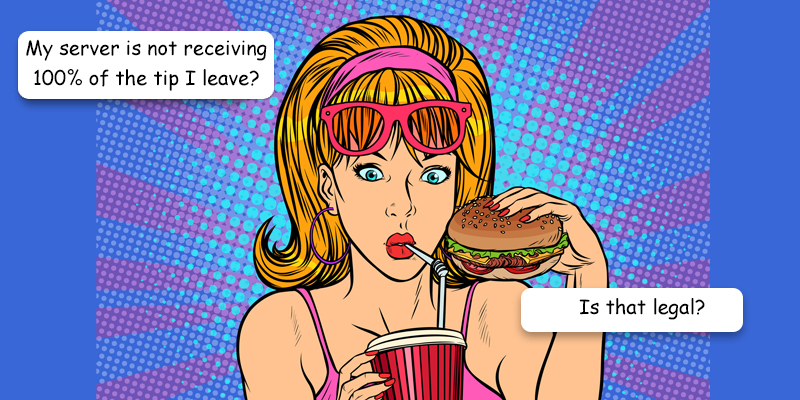There are two questions that are brought up when talking about the topic of whether to deduct credit card processing fees before paying out charge tips to your employees. Can you do it, and should you do it?
Credit card processing fees can be a significant expense to any business. In 2022, the average credit card processing fee ranged between 1.5% and 3.5% of the sale. There are a number of businesses that charge the consumer a convenience fee when paying by card over cash to cover this added expense, but that practice has not caught on for restaurants. At least, not yet.
When a customer leaves a tip on a credit card for a server, the employer owner pays the processing fee. The employer is basically paying a transaction fee for a customer to give money to an employee. So, why not pass that fee on to the employee?
First, let’s cover the ‘can you do it?’ According to the federal government’s Fair Labor Standards Act (FLSA), an employer CAN deduct a credit card fee. It is clearly stated in the Special Circumstances for Tipped Employees on the Department’s website. Of course, rules must be followed to remain in compliance. The employer can only deduct the fee associated with the tip amount; not the entire bill. The tip amount due to the employee must be paid no later than the regular pay day and may not be held while the employer is awaiting the deposit from the credit card company. The employer may only deduct a fee if the employee’s rate of pay will be at or above minimum wage.
How much to deduct can be simplified. Every employer knows that credit card fees are not simple. There are different rates for different brands of cards, as well as the benefits the card provides to the card holder. Interchange fees, assessment fees, swipe fees, terminal fees and so on. Even with a translator, it may be hard to understand all of the different fees that are charged. Courts have maintained that “in the aggregate, the amounts collected from its employees, over a definable time period, have reasonably reimbursed it for no more than its total expenditures associated with credit card tip collections.” Simplified to mean, the employer can look at the average cost of processing fees by taking the total amount of the processing fees divided by the total amount in charge sales. Since fees may change from time to time, it may be a good idea to recalculate the average every few months and to be safe, maybe error in favor of the employee and round it down a bit.
Just because it is legal on the federal level does not mean it is not illegal on the state level. There are a handful of states that prohibit this practice, such as California, Maine and Massachusetts. There are a few states where the law is vague, such as Delaware, Kentucky and Montana. These states use language, such as “all tips, including those left by credit card, belong to employees.” All being the keyword, and a deduction from tips, may not be considered all. Don’t be a pioneer in these states. There are also states, such as Colorado, where there are complex rules, such as posting a public notice and losing the tip credit. As we all know, laws can change, and often do, so before you make any decision to deduct a processing fee based on the states I do not have listed above, check with your state.
Now that you know whether you can, should you? This may very well be what stops most employers from deducting any fee from tips. It comes down to morale. Tipped employees are typically not large wage earners and any mandatory deduction from their pay may not sit well. The concept of deducting a fee is not new. Way back in January 2008, Outback Steakhouse began to roll out the practice across its restaurants. After numerous complaints from employees, customers (yes, customers), and experiencing low morale, they not only stopped the rollout, but refunded any fees that were deducted.
While credit card fees may be escalating, it seems like the last place to make it up is from the employees. If the average tip is 15% and the average credit card fee is 2.5%, then that amounts to 0.375% of the sale amount. That’s $0.38 on a $100.00 sale. Low morale of a server is certainly going to lose more customers than increasing the menu prices by maybe a nickel.
While I make every attempt to ensure the accuracy and reliability of the information provided in this article, the information is provided “as-is” without warranty of any kind. They may be additional situations that apply to you that are not mentioned above. PayMaster, Inc and Romeo Chicco do not accept any responsibility or liability for the accuracy, content, completeness, legality, or reliability of the information contained. Consult with your CPA, Labor Attorney, and/or HR Professional to ensure you are in compliance.


[…] of deducting credit card fees from tips under the Fair Labor Standards Act (FLSA), as detailed in a Paymaster article in 2023, Sparks criticizes the practice for its potential to demoralize staff. The Paymaster article […]